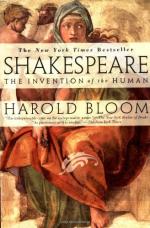|
This section contains 459 words (approx. 2 pages at 400 words per page) |

|
Chaps. 12-14 Summary and Analysis
The Merchant of Venice
pp. 171-191
The author defines Shylock as a comic villain, and the one who gives Portia the power to dominate the play. Antonio, as the good Christian, is overtly anti-Semitic. The play is largely a reaction formation to Marlowe's play, the Jew of Malta. Shylock has the full character of a human being with mixed feelings, yet still can demand his pound of flesh. The author is somewhat upset that Shakespeare ends with Shylock agreeing to a forced religious conversion to Christianity. There is an added dimension, in that unlike in the Marlowe play, the Christians in the play are shown to be often as vicious as the Jew, Shylock. The author also finds Shylock to be a predecessor for later Shakespeare villains Edmund in King Lear, and Iago in Othello.
Much Ado About Nothing...
(read more from the Chaps. 12-14 Summary)
|
This section contains 459 words (approx. 2 pages at 400 words per page) |

|




